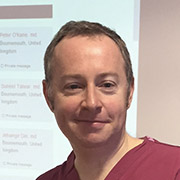09
Feb
2016
00:00
GMT
Webinar
Bioresorbable Vascular Scaffolds: The Future in Our Hands?
-
Views:
 1303
1303
-
Likes:
 0
0
Overview
The first case report of Bioresorbable Vascular Scaffolds (BVS) implanted in human coronary arteries was in 2006. A decade on and over 120,000 patients worldwide have received Absorb, the most widely studied of the resorbable devices. The main theoretical advantage of a BVS over a conventional metallic drug eluting stent (DES) is that the artery will be free of long term implant with restoration of vasomotion. An extensive research programme has been undertaken with several studies across different patient demographics comparing Absorb with Xience (the most widely studied DES) showing non-inferiority at one year with long follow up awaited.
Many of the patients within the clinical trials to date have had relatively simple lesions treated but there are trials actively recruiting that are testing the device in more complex lesions subsets.
The are many technical aspects of BVS implantation that require additional training above standard PCI techniques that an operator should acquire before considering use of the device. Lesions require more extensive preparation than perhaps is necessary for routine DES use and intra-coronary imaging is really important particularly in the early learning curve.
Faculty:

Peter O’Kane
This webinar is supported by

Key Learning Objectives
- Why use BVS
- How to implant the device
- How to ensure optimal results
- How to avoid complications
- Evidence review of the literature
Target Audience
- Cardiology Interventional Consultants
- Interventional Fellows
- Allied Health Professionals
- Industry partners
Faculty Biographies

Peter O’Kane
Dr Peter O'Kane has been Editor-in-Chief of Interventional Cardiology: Reviews, Research, Resources (ICR3) since July 2021.
Dr Peter O’Kane was appointed as a consultant interventional cardiologist at Royal Bournemouth Hospital in July 2007 and has performed more than 7000 PCI cases. He has extensive experience with coronary physiology and intra-coronary imaging to guide intervention and the many tools and techniques to manage bifurcations, calcification and chronic occlusions.
Dr O'Kane has given his permission to be contacted here.





